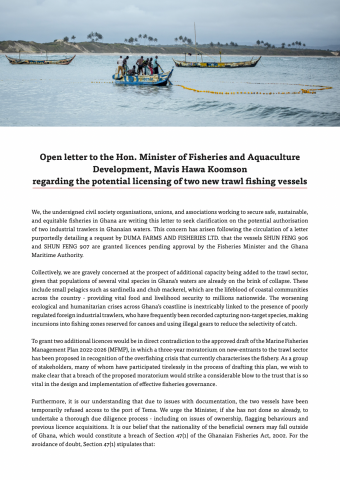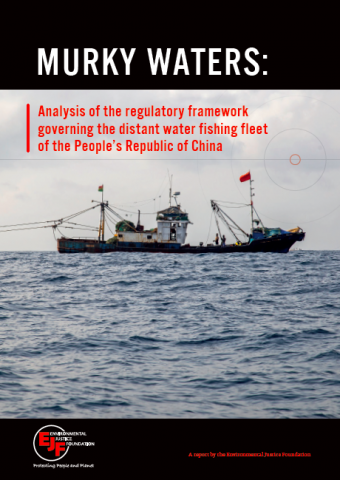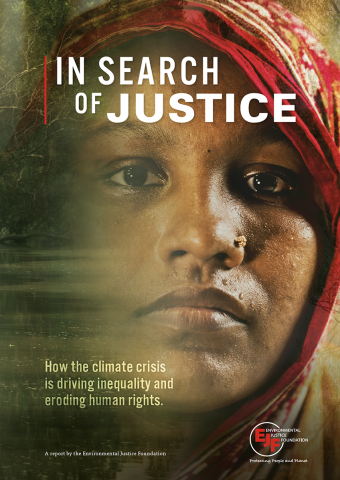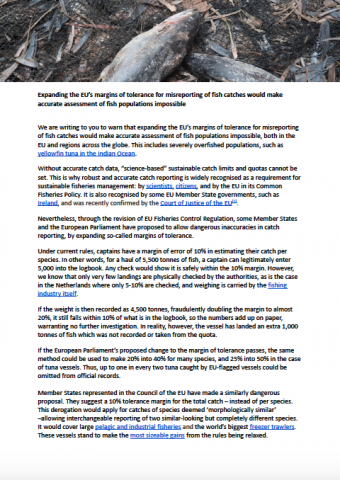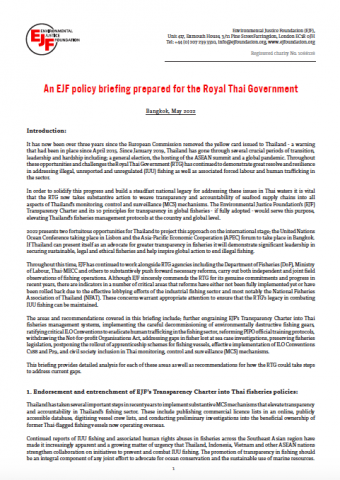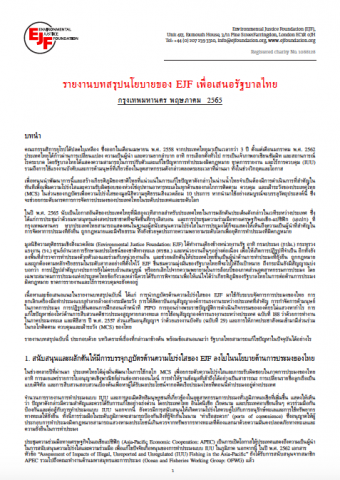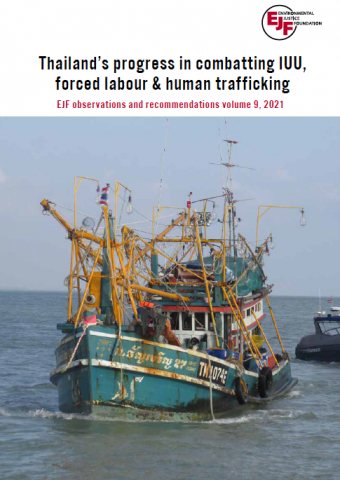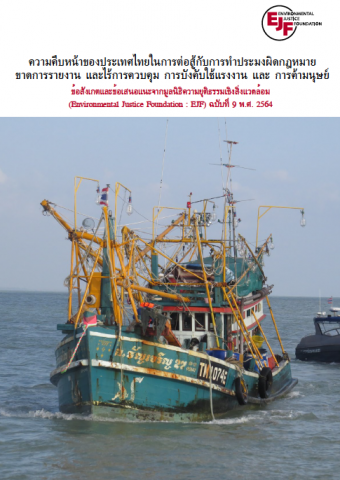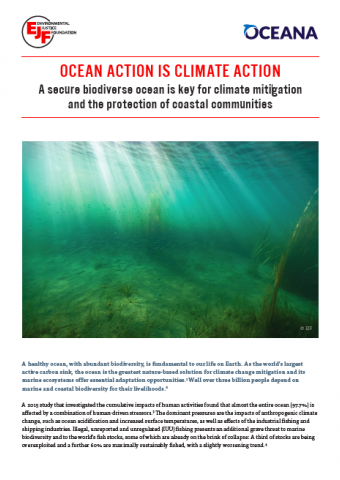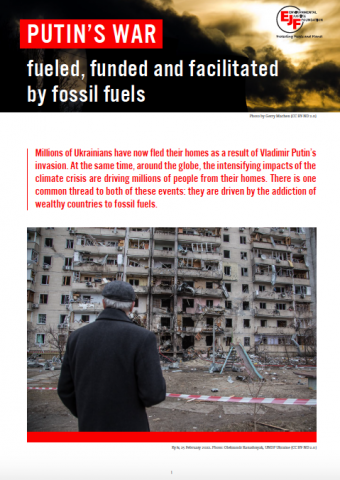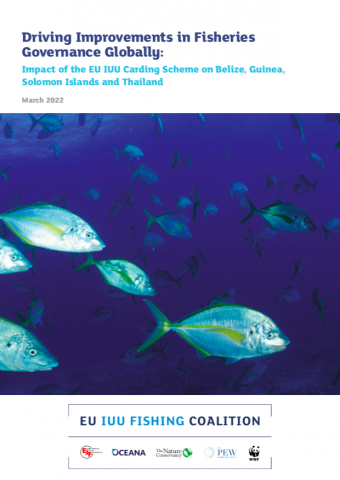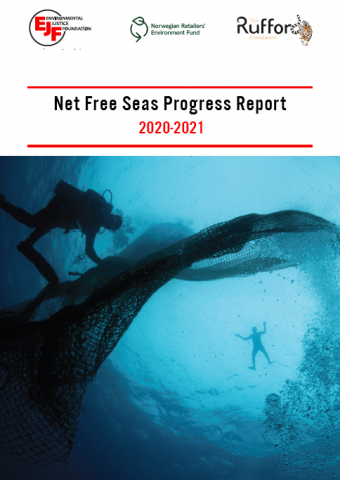Open letter to the Hon. Minister of Fisheries and Aquaculture Development, Mavis Hawa Koomson regarding the potential licensing of the two new trawl fishing vessels: The worsening ecological and humanitarian crises across Ghana's coastline are inextricably linked to the overcapacity of its poorly regulated and foreign-owned industrial trawl fleet. This open letter from EJF and other civil society organisations in Ghana has been written to seek clarification on the potential authorisation of two industrial trawlers in Ghanaian waters, which would allow the continued exploitation of its natural resources.
Murky Waters: Analysis of the regulatory framework governing the distant water fishing fleet of the People’s Republic of China: Regulations governing China’s distant-water fishing fleet are fostering a lack of transparency that enables rampant illegal fishing around the world. Better monitoring, regulation and transparency is urgently needed.
In search of justice: How the climate crisis is driving inequality and eroding human rights: This report highlights how the climate crisis is fuelling inequalities within and between countries worldwide, with low-income, marginalised people in both developed and developing countries being disproportionately affected by climate breakdown.
Open letter: Expanding the EU’s margins of tolerance for misreporting of fish catches would make accurate assessment of fish populations impossible: Expanding the EU’s margins of tolerance for misreporting of fish catches would make accurate assessment of fish populations impossible, both in the EU and regions across the globe. This includes severely overfished populations, such as yellowfin tuna in the Indian Ocean.
EJF policy briefing prepared for the Royal Thai Government: It has now been over three years since the European Commission removed the yellow card issued to Thailand - a warning that had been in place since April 2015. Since January 2019, Thailand has gone through several crucial periods of transition, leadership and hardship including; a general election, the hosting of the ASEAN summit and a global pandemic. Throughout these opportunities and challenges the Royal Thai Government (RTG) has continued to demonstrate great resolve and resilience in addressing illegal, unreported and unregulated (IUU) fishing as well as associated forced labour and human trafficking in the sector. This briefing provides detailed analysis for each of these areas as well as recommendations for how the RTG could take steps to address current gaps.
รายงานบทสรุปนโยบายของ EJF เพื่อเสนอรัฐบาลไทย: คณะกรรมธิการยุโรปได้ปลดใบเหลืองซึ่งออกในเดือนเมษายน พ.ศ.2558 จากประเทศไทยมาเป็นเวลากว่า3ปีแล้ว ตั้งแต่เดือนมกราคม พ.ศ.2562 ประเทศไทยได้ผ่านช่วงเวลาสำคัญของการเปลี่ยนผ่าน ความเป็นผู้นำ และความยากลำบากหลายครั้ง รวมถึง การเลือกตั้งทั่วไป การเป็นเจ้าภาพการประชุมสุดยอดอาเซียน และการระบาดใหญ่ทั่วโลก โดยรัฐบาลไทยได้แสดงความสามารถในการปรับตัวและแก้ไขปัญหาการทําาประมงผิดกฎหมาย ขาดการรายงาน และไร้การควบคุม (IUU) รวมถ่งการใช้แรงงานบังคับและการค้ามนุษย์ที่เกี่ยวข้องในอุตสาหกรรมดังกล่าวตลอดระยะเวลาที่ผ่านมาทั้งในช่วงวิกฤตและโอกาส รายงานสรุปนี้ให้การวิเคราะห์โดยละเอียดสำหรับแต่ละประเด็น ตลอดจนคำแนะนำว่ารัฐบาลไทยสามารถดำเนินการตามขั้นตอนต่างๆ เพื่อจัดการกับช่องว่างในปัจจุบันได้อย่างไร
Thailand’s progress in combatting IUU, forced labour & human trafficking: EJF observations and recommendations volume 9, 2021: Since February 2016, EJF has carried out multiple in-depth observations of the Royal Thai Government’s (RTG) initiatives aimed at tackling IUU fishing and human trafficking in the Thai fishing industry. EJF has observed all stages of the monitoring, control, and surveillance (MCS) systems in place with visits to all 30 ‘Port In Port Out’ (PIPO) centres, all three Thai Maritime Enforcement Coordinating Centre (THAI-MECC) Area Commands, as well as witnessing multiple at-sea patrols conducted by the Royal Thai Navy (RTN), Marine Police, Department of Fisheries (DoF) and Department of Marine and Coastal Resources (DMCR).
ความคืบหน้าของประเทศไทยในการต่อสู้กับการทำประมงผิดกฎหมาย ขาดการรายงาน และไร้การควบคุม การบังคับใช้แรงงานและการค้ามนุษย์: ข้อสังเกตและข้อเสนอแนะจากมูลนิธิความยุติธรรมเชิงสิ่งแวดล้อม ฉบับที่ 9 พ.ศ. 2564: ตั้งแต่เดือนกุมภาพันธ์ พ.ศ. 2559 มูลนิธิความยุติธรรมเชิงสิ่งแวดล้อมได้ดำเนินการสังเกตการณ์เชิงลึกหลายครั้งเกี่ยวกับโครงการริเริ่มของรัฐบาลไทยที่มุ่งแก้ปัญหาการประมงผิดกฎหมาย และการค้ามนุษย์ในอุตสาหกรรมประมงของไทย มูลนิธิความยุติธรรมเชิงสิ่งแวดล้อมได้เฝ้าสังเกตทุกขั้นตอนของระบบติดตาม ควบคุม และเฝ้าระวัง (MCS) พร้อมเยี่ยมชมศูนย์ควบคุมการแจ้งเรือเข้าออก (PIPO) ทั้งหมด 30 แห่ง ศูนย์อำนวยการรักษาผลประโยชน์ของชาติทางทะเลง รวมถึงการสังเกตการณ์การลาดตระเวนในทะเลหลายครั้งที่ดำเนินการโดยกองทัพเรือไทย ตำรวจน้ำ กรมประมง และกรมทรัพยากรทางทะเลและชายฝั่ง
Ocean action is climate action: A secure biodiverse ocean is key for climate mitigation and the protection of coastal communities: This policy briefing by the Environmental Justice Foundation (EJF) and Oceana lists actions the German G7 Presidency should take to achieve a 30x30 ocean protection plan which safeguards biodiversity, advances the goals of the Paris Agreement and protects the human rights of coastal communities.
Putin's war: fuelled, funded and facilitated by fossil fuels: Millions of Ukrainians have now fled their homes as a result of Vladimir Putin’s invasion. At the same time, around the globe, the intensifying impacts of the climate crisis are driving millions of people from their homes. There is one common thread to both of these events: they are driven by the addiction of wealthy countries to fossil fuels.
Driving Improvements in Fisheries Governance Globally: Impact of the EU IUU Carding Scheme on Belize, Guinea, Solomon Islands and Thailand: The European Union's IUU Regulation is designed to prevent and stop the flow of illegally caught fish from entering the EU market. This report highlights instances where this EU carding scheme has prompted positive changes in fisheries governance.
Net Free Seas Progress Report 2020-21: The Net Free Seas Progress Report summarises achievements, challenges, and lessons learned from the implementation of the Net Free Seas project between 2020-2021. So far, the project has worked with over 100 artisanal fishing communities across Thailand to collect and recycle 35 tonnes of discarded fishing nets. รายงานความคืบหน้าของโครงการทะเลปลอด (เศษ) อวน (Net Free Seas) ปี 2563 - 2564 รวมสรุปการดำเนินงาน ความสำเร็จ ความท้าทาย และการถอดบทเรียนของโครงการ โดยในปัจจุบันโครงการได้ร่วมงานกับชุมชนประมงพื้นบ้านกว่า 100 ชุมชนในประเทศไทย จัดเก็บและรีไซเคิลเศษอวนประมงไปกว่า 35 ตัน
